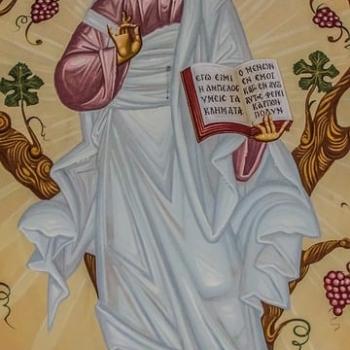
Catholicism asserts that not only does God exist, but that He has revealed Himself within the stream of human history. Divine revelation provides the basis for Catholic doctrine. But what exactly is the relationship between revelation and doctrine? In what way, if any, do revelation and doctrine affect how Catholics worship?
In this paper, I will suggest that revelation acts upon and excites human reason, which in turn develops the doctrines that become the foundation of Catholic worship.
Revelation
The word apocalypse often has a negative connotation, as it is frequently associated with the end of the world. However, apocalypse is a translation from a Greek word meaning to unveil or uncover something. Similarly, revelation is the laying bare or uncovering of something.
In a specific sense, John’s Book of Revelation can be understood this way. However, in a much more general way, the whole of the Bible can be seen to contain strains of revelation.
In whatever sense one interprets it, revelation is generally defined as God disclosing and communicating Himself and His will to the human race. Catholic theology differentiates two types of revelation; natural and supernatural.
Natural revelation refers to knowledge about God gleaned from abstract reasoning (philosophy) and observation (order and sophistication in the natural world). Supernatural revelation involves God communicating truths that are beyond the capacity of the unaided human intellect to comprehend. An example of this type of revelation would be God as a trinity of persons.
Regardless of the form that revelation takes, the truths disclosed are forms of communication. Communication entails a communicator (i.e., God) and the one who receives the communication (human beings). Furthermore, communication – whether issued or received – entails intelligence or reason.
Reason
Depending on one’s philosophy and theology, reason can be defined quite differently. Within philosophy and theology, a definition of reason involves the three acts of the intellect, the ability to apprehend the essence of a thing, the ability to make judgments, and the capacity to make advances in knowledge.
Now it must be that reason acts in response to information obtained from the senses. Put differently, reason responds to data that is communicated to it. If Divine revelation is a form of communication, then the human intellect should be engaged by revelation.
Let us assume that the information provided to human beings by revelation is subjected to the three acts of the mind. In that case, it is certainly likely that fallible human beings will misunderstand no small amount of the data provided. It is a point that I will return to below.
Now if God intended revelation to impart certain truths to human beings, and those truths are subject to be misconstrued, then it is no surprise that Christianity has experience heresy.
To rectify this fact, the Church must develop doctrine.
Doctrine
Doctrine is any truth taught by the Church as necessary for acceptance by the faithful. Within the umbrella of doctrine, the Catholic Church further identified three types of truth. The formally revealed truth is that which has been shown to human beings by God. An example would be the Real Presence of God in the Eucharist. The second type of truth involves a theological determination, such as the canonization of a saint. Finally, there is truth within the domain of natural law. An example of this type of truth would be the sinfulness of homosexuality.
As time allows revelation to be contemplated by numerous minds, the understanding of revelation changes, and that change must be reflected in doctrine.
Ultimately, what makes a truth doctrine is that the Catholic Church teaches that it is to be believed by Catholics. The promulgation of doctrine includes what is known as ex-cathedra pronouncements. These are teachings or statements issued by the Pope. It refers to binding and infallible papal teachings promulgated by the Pope when he officially teaches in his capacity as the universal head of the Church. The teachings involve matters of faith or morals and are addressed to the entire world.
An objection may arise. If God has revealed Himself and His will to human beings, and this revelation is contained in sacred Scripture, why is there any need for doctrine? Is not the Bible sufficient?
A response to this question can be drawn directly from the Bible. In the Book of Acts, we read of Philip the Evangelist’s encounter with an Ethiopian who was reading the Old Testament. Philip asks him, “Do you understand what you are reading?” He replied, “How can I, unless someone guides me?” (Acts of the Apostles 8:29-31). It is the responsibility of the Catholic Church, by virtue of doctrine, to guide all of us.
Perhaps this leads to another question, how can we know that what the Church teaches is what God intended? Here too, Scripture provides an answer. In John 16:13, Jesus foretells Pentecost and the Catholic Church’s creation. “But when he comes, the Spirit of truth, he will guide you to all truth.” This “Spirit of truth” is, of course, the Holy Spirit who does indeed come on Pentecost. (See chapter two of the Acts of the Apostles).
One last point: if God has revealed Himself to transmit truth, it seems illogical that He would do so knowing that the fallible human intellect is likely to fall into error regarding that truth. Put differently, God created the Catholic Church, at least in part, to be the depository of the truth that He intended to be dispensed. Such a depository acts to forestall error.
Hopefully, it has become clear that revelation acts upon the human mind, which seeks to understand. The product of understanding is doctrine. Of course, the purpose of this process of revelation, reason, and doctrine is to allow us to worship God properly.
Worship
Worship, in the theological sense of the word, is giving the proper honor, praise, and respect owed to God as our creator. Divine worship includes three principal acts: adoration (or the recognition of God’s infinite perfection), prayer or asking for divine help, and sacrifice or offering something precious to God. Worship as veneration also has three principal forms: the angels and saints are honored for their sanctity, asked to intercede before the divine Majesty, and imitated in their love and service of God. (See Father John Hardon’s Modern Catholic Dictionary).
If revelation is God showing Himself and revealing His will to human beings, then doctrine is a human response to seeking to understand what God has revealed. Finally, worship is putting that understanding into practice by placing oneself in a proper relationship with God.
Conclusion
In this paper, I have suggested that Divine revelation stirs the human intellect to action. This action, working in and through the Church that God created, results in the development of doctrine. In turn, doctrine makes the proper worship of God possible.











